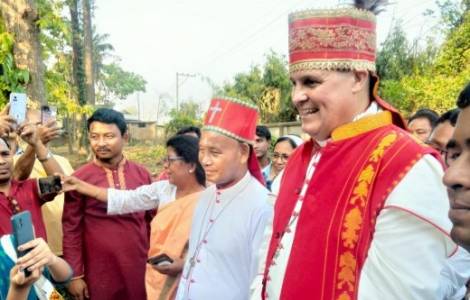
by Fabio Beretta
Dhaka (Agenzia Fides) - "The situation in Bangladesh", where Christians represent only 0.30% of the population, "is very delicate. In general, Christians live in a peaceful context, but there have also been cases of harassment by their neighbors," said Archbishop Kevin Randall, Apostolic Nuncio in Bangladesh since 2023, interviewed by Fides after his recent meeting with the Chief Advisor to the interim government. He spoke to Fides about the country's society and the commitment and support of the local Church and of Pope Francis for Rohingya refugees.
What is the situation in Bangladesh after the recent protests and social unrest?
The situation in Bangladesh is very delicate. With a transitional government, some wonder when there will be elections. Others want to rewrite the constitution. Still others say that a transitional government does not have the power to rewrite the Constitution. In the meantime, citizen violence dominates the country and the rule of law is limited.
How are Christian communities experiencing this historic moment?
In general, Christians live in a relatively peaceful context, but there have also been cases of harassment by their neighbors. The police are powerless. After Sheik Hasina left the country, many officials became afraid and went into hiding. They took off their uniforms to wear civilian clothes and stopped going to work.
Do Christian communities have special expectations compared to the rest of the population?
Yes, the Christian community hopes that the transitional government will protect minorities during this transitional period. Christians' villages are under threat because there are people who want to take over their land, even if they belong to their own ethnic group. Many citizens, whether Christian, Buddhist or Hindu, are treated as undesirables, "as if they were foreigners," although they are not. The Constitution declares Bangladesh a secular state with one official religion: Islam. However, there are some who confuse the phrase "official State religion" with the idea that "minorities do not belong here" and that the country is "an Islamic State."
During the meeting with Muhammad Yunus, Chief Advisor to the interim government, the need to "protect" minorities was raised. Where does this concern come from?
According to the 2022 census, Christians in Bangladesh make up 0.30% (about 500,000 believers) of the population. There have been cases of threats against villages, houses and especially schools. In many Catholic schools, there have been attempts at intimidation, with several teachers threatened with expulsion. Some Muslims reported to the school administration that their children would dress in a certain way in the future, especially if they were girls. However, wearing the burqa violates our uniform regulations. With Muhammad Yunus, I raised issues that concern Christians, but also Buddhists and Hindus. One must not forget that the Hindu minority is about 8%. Many of their temples have been destroyed and their shops burned down. And the Chief of the interim government agreed that all minorities must be protected and promised that he would try to create a law that can bring order.
Recently, the establishment of a body for interreligious dialogue between the Holy See and the scholars of Islam in Bangladesh was proposed. How was this idea received?
The idea of having an interreligious dialogue is not mine. The Dicastery for Interreligious Dialogue asked for it in a letter years ago, when Cardinal Jean-Louis Tauran was the head of the then Pontifical Council for Interreligious Dialogue. Tauran himself spoke about it with former Prime Minister Sheik Hasina during one of his visits here in Bangladesh. I have already raised this idea with Sheik Hasina, and recently I have also asked Muhammed Yunus and his team to think about this possibility in concrete terms. The concept has been well received, but I think they have other concerns at the moment.
Are there already concrete steps towards this project?
No, but we can propose them. But we cannot force them. Unlike in the United Arab Emirates, where Pope Francis signed the document on fraternity, or in Indonesia, where the Pope recently signed a new document on tolerance and praised the "tunnel of friendship" that connects the cathedral with the mosque in Jakarta, interreligious dialogue does not find much support in Bangladesh, even if it takes place at the level of academic discussions.
Regarding humanitarian aid for the Rohingya refugees, Mohammed Yden has reportedly asked the Vatican for support. How can this request be met?
The Chief Advisor of the interim government did not directly ask for the Holy See's help, as has been reported in various media. He asked for the Holy See's support in the reforms he and his government want to implement, but not for financial help, including for the Rohingya.
It was the one who asked on behalf of the Pope to continue to help and protect the Rohingya. I explained that the Catholic Church's Caritas organization has been continuously helping the displaced since 2017, but that funds are decreasing. Before I traveled to Bangladesh, Pope Francis asked me not to forget the Rohingya. These refugees have experienced violence in their own country and came to Bangladesh to ask for help. But unfortunately, the Rohingya are considered by the local population as an ethnic and religious group that belongs to "this country", Bangladesh.
Cardinal Patrick D'Rozario and I paid them an official visit. The living conditions are very difficult. Children and young people do not receive an education. In addition, by law, 25 percent of our aid must go to the Bengali community. However, I am happy to announce that the Pope is sending further financial aid. This gesture of his will help many. (Agenzia Fides, 26/9/2024)